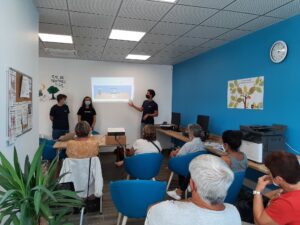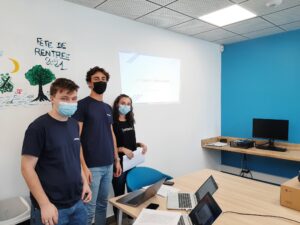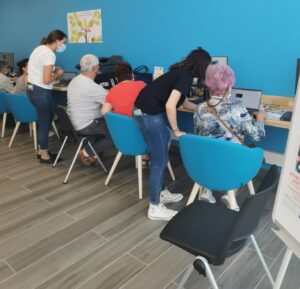A part of the population is currently experiencing difficulties in accessing digital technology. This situation, often referred to as the digital divide, is becoming even more detrimental given that new technologies are now almost indispensable, whether it is a question of carrying out administrative procedures, declaring taxes online or communicating with relatives on the other side of the world.
As an education institution, Epitech has a major responsibility towards its students and towards the society as a whole. Its role is to prepare students to become responsible citizens, conscious of current and future global issues.
Information and Technology is progressively transforming our societies. Therefore, our students have an important role to play: to innovate and to find solutions to different issues we are currently facing in our societies.
In this context, we have launched DIVERSITY by Epitech program, in order to enable our students to engage in concrete actions to foster inclusion in the IT field.
What is the digital divide?
The digital divide is defined by 2 aspects. It can be a problem of lack of proficiency or basic skills in the use of digital technology (like using a mailbox, browsing the internet) and/or an equipment problem (no computer or smartphone/ no internet connection).
In the Epitech DIVERSITY module, we focus on the development of basic skills. In other words, Epitech students use their skills to share their knowledge with people in difficulty through group workshops, mentoring or specific activities.
Why it’s so important to address this problem?
First and foremost because it affects more than 12 million people in France (2019 figures), particularly among the most vulnerable populations such as: low-income households, people over 75 years old, people with few or no diplomas, people living in rural areas, etc. These are some of the profiles most affected by the digital gap.
This problem of access or use of digital tools has an important consequence for these people. Today, who can live a normal life without having access to public platforms that allows us to manage our rights, apply for a job or to communicate with our loved ones?
This lack of digital skills creates additional difficulties in situations that are usually already challenging.
Our partnership with the CCAS of Castelnau-le-Lez
In the framework of DIVERSITY project, Epitech students can open up to new environments, develop new skills and become directly involved with people who have difficulties in using digital technology.



Epitech Montpellier has built a solid partnership with the CCAS of Castelnau-le-Lez town hall through the “Castelnau déclic” program. In this regard, Epitech students are providing individual support and assistance to people who wish to learn how to use computers, tablets and smartphones.

Matisse Page (3rd year student at Epitech Montpellier & Project Manager in the Junior Conseil of Epitech Take) volunteered and took part in this program. One day a month he’s offering individual support and assistance to young people, active people, jobseekers, or senior citizens in using computers, tablets and smartphones, as well as answering all their specific questions. We had the chance to talk with Matisse and know more about his overall experience during this program:
Why did you choose to participate in the “Castelnau déclic” program?
At EPITECH, we are encouraged to share our knowledge, so it felt completely normal for me to take part in this project because I heard that by 2022, the government is going to dematerialize 100% of the administrative procedures, while 30% of the population is still far away from digital technology. To avoid these inequalities and to stop this digital gap, I felt is important to get involved.
What was your role during this program?
I was in charge of preparing the topics as well as facilitating the workshops. Some of the topics covered were digital objects, social networks, how to avoid harmful people online & malware, how to use a cloud etc.
How was the program structured?
We have generally tackled these topics in a short presentation of about 20 minutes and then switched to practice in order to encourage discussions. A quite challenging aspect for us, as we are quite “techy”, was to remain simple and clear in our explanations in order to be as comprehensible as possible.
What did you enjoy the most during this program?
What I appreciated the most during this program was the practical sessions because we always set aside some time to answer their questions regarding the issues they encounter on a daily basis and it was great to be able to clarify certain points for them.
What did this experience have brought to you?
This experience reinforced my belief that knowledge sharing is a powerful asset and that we must continue to encourage these exchanges.
For more information about Epitech Diversity and our different ongoing initiatives to foster inclusion in the IT sector click here.